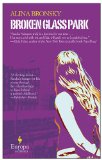Summary | Excerpt | Reading Guide | Reviews | Beyond the Book | Readalikes | Genres & Themes | Author Bio

“I can’t get at him at the moment anyway,” I said. “You know he’s still in prison. He’ll be there for years.”
“Is that how long it’s going to take?” said Anton.
“Yeah,” I said, “but it’s better that ay—I’ll have plenty of time to plan it out. It’s not that easy to kill somebody when you’ve never done it before, you know.”
“It’ll be easier the second time around,” said Anton like an expert.
“I just want to pull it off this one time,” I said. “I don’t want to make a hobby out of it.”
I was relieved that Anton also thought it was a good idea. Vadim is his father, after all. But the little guy hates him just as much as I do. Maybe even more. He had already been a basket case beforehand, because unlike me he was always afraid of Vadim.
These days Anton’s still in bad shape, showing no signs of improvement, and I sometimes ask myself whether all the therapy will do any good at all. He stutters, can’t concentrate in school, wets his bed, and starts to shake whenever someone raises their voice. All this despite the fact that he claims not to remember anything. I always tell him: count yourself lucky if that’s the case. I’m happy I can’t remember anything, either—even though I was there.
I can discuss one of my dreams with Anton. But not the other one. Because anytime the word “mama” is mentioned in his vicinity, he freezes and just sits there dead still like a statue— as if he’s just been kissed by the Snow Queen. My mother often read us the fairytale of the Snow Queen. She loved Hans Christian Andersen, loved that story in particular. Whenever somebody was mean, she would say they probably had a piece of the mirror in their eye or heart—she meant the mirror from the Snow Queen, the one the evil troll shattered. That’s just how she was.
To shield him, I smack anyone who says the word “mama” in front of Anton. Not adults, obviously—I just shout at them. It always works. It’s the least I can do for my little brother.
Well, that and not chasing him out when he comes crying to my room at night, crawls into bed next to me, and then is so frightened when the alarm goes off in the morning that he pisses on my leg.
I sometimes worry what it will be like after I’ve fulfilled my
first dream and Vadim is dead.
When I was younger, I thought I wanted to be famous, just like everybody else on the planet. I didn’t have anything against the idea of having a well-known mother, either, who smiled from the cover of every magazine and was the talk of the town. But then when we did become known, I could have shot them all—all the photographers and cameramen and the reporters with their microphones and little notepads, filming the entrance to our building and knocking on our neighbors’, doors to ask how loud it had been that night. Who screamed, who cried, who ran, and whether Vadim had really said “There’s blood in there, don’t go in,” and “It’s over, get out of
here.”
Only when one of us emerged—me or Anton, since Alissa still had to be carried then—would they shut their mouths, shuffle to the sides of the hallway to clear a path for us, and watch us pass out of the corners of their eyes.
I had hoped they would try to talk to me or Anton, because then I would have felt justified in knocking the cameras out of their hands or the teeth out of their skulls. But they wisely steered clear of me—there must have been a toxic cloud hanging over me, like Chernobyl. Then again I figured it was probably for the best that they didn’t ask me questions and that I didn’t react because my mother was always opposed to violence. And she knew exactly what violence felt like.
Excerpted from Broken Glass Park by Alina Bronsky. Copyright © 2010 by Alina Bronsky. Excerpted by permission of Europa Editions. All rights reserved. No part of this excerpt may be reproduced or reprinted without permission in writing from the publisher.
Being slightly paranoid is like being slightly pregnant – it tends to get worse.
Click Here to find out who said this, as well as discovering other famous literary quotes!
Your guide toexceptional books
BookBrowse seeks out and recommends the best in contemporary fiction and nonfiction—books that not only engage and entertain but also deepen our understanding of ourselves and the world around us.